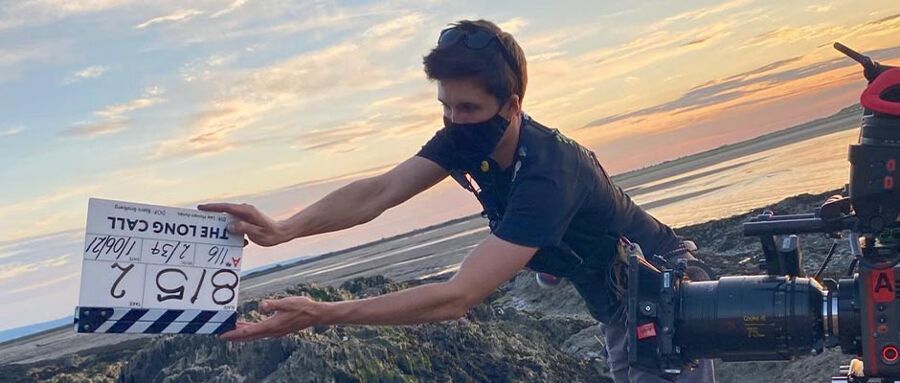
Liam Morgan
Digital Film Production BSc (Hons)
Thanks to securing work experience on a BBC series, Liam discovered that the TV and Film industry was perfect for him. After excelling in his course at BCU, the graduate went on to work in sports broadcasting before kickstarting his exciting career in major TV dramas and films. Liam is now excited about his future in his chosen industry, with big goals ahead.
“I never planned on going to University, but I knew I wanted to do something technical, and had always been interested in Media. When I was at Sixth Form, the BBC series ‘Atlantis’ was being filmed in the woods close to my house, so I went along and asked if I could do some work experience with them. They kindly accepted, and the moment I stepped onto the film set, I knew it was the career I wanted.
I spoke with the Producer about next steps, and she suggested that attending university was a great place to start, to gain contacts and build up knowledge about the film industry. I searched for Film courses on UCAS, and BCU’s Film Production Technology was the vert first one I looked at. I read the description, and knew it was the course for me.
When I started the course, I did feel at a slight disadvantage. The majority of the other students had previously studied media, photography or film related subjects at colleges beforehand. But I hadn’t studied anything to do with film. I didn’t even know how to use a DSLR camera! But this only made me more determined to learn as much as everyone else already knew, and within a few short months, I felt a lot more confident.
BCU gave me so much knowledge and made me confident for jobs outside of University. It was a great place to network and shoot short films, which helped me decide what roles I’d be most interested in. As it was such a practical course, so it gave me a lot of hands-on experience.
I’ve been working in the industry ever since graduating. After BCU, I spent a year filming broadcast sports, but I was keen to progress into TV and film. I was fortunate to get onto the ScreenSkills Film Finder from April 2019 for one year as a Camera Trainee, which helped to kickstart my career.
The scheme helped to place me on two feature films in London called ‘After Love’ and ‘Venom: Let There Be Carnage’. As I worked on more jobs, I built up a bigger network of contacts, and have been lucky to keep working. In May 2021, I stepped up to Second Assistant Camera, which has been a huge amount of fun.
My average working day involves me arriving early on set, along with the Camera Trainee to prepare for the day ahead. We get the camera equipment ready on set, whether that be unloading it from the truck if we are on location or moving it into the studio. I power up the cameras and monitors, and make sure we’re ready for the day. We’ll then get the call sheets, and I study the scenes we’re filming, and the locations of each one.
Once the filming starts, I’m then in charge of helping to change lenses, filters, liaising with production and rental houses, organising my team and of course, clapping the clapperboard in front of each take!
Getting your foot in the door of the industry is by far the hardest part. You have to be persistent and work really hard. You also have to learn how to deal with rejection. I used to send many emails out with no replies, which can be daunting, but you can’t give up. Someone will be willing to give you that break and before you know it, you won't be asking around for work, the work will find you. Eventually, I’d love to become a Camera Operator on TV dramas and film.
Since graduating, my proudest achievement was taking stills photographs of Jodie Comer and Stephen Graham on the set of Channel 4 drama ‘Help’, which was about the Covid outbreak in a care home. I was working on the drama as a Camera Trainee, and the Producer asked if someone in the camera department could take stills. I instantly jumped at the chance and it was great fun.
Nowadays, I feel a lot more confident in myself, and I’ve also learned how to work well in a team. Filmmaking is all about working with people with certain skills in each department and relying on each other. It’s like being a cog in a machine, and if your cog isn't turning, the machine won't work.
My advice to current students would be to use your time at university wisely. Keep making films, work out what you want to do and what you are good at. Network and get yourself out there too. Birmingham is a great hub, especially with more film productions and TV shows working there lately. I’d also recommend working for free, but make sure it’s worth your time, effort and that you’re going to get something out of it too.
Also, keep in touch with your fellow students. If you help them out, they will help you out too. I was lucky to have my first few Camera Trainee jobs offered to me by a previous student. I then repaid the favour by helping them get work later down the line. It is a competitive industry, but you shouldn't compete against each other. The bigger network you have, the better.
My career was sculpted by BCU and has got me to where I am now. I am grateful for the opportunities I had, and I definitely made the most of the facilities, equipment and my fellow students. I'm not sure where I would be now without BCU.”